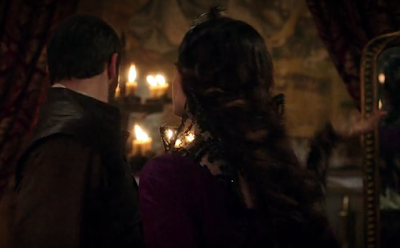Read the next entry here!
Revelations abound as the first season of Galavant moves closer to its ending.
1.6, "Dungeons and Dragon Lady"
Written by Dan Fogleman, Kirker Butler, Jeremy Hall, Luan Thomas, and Joe PiarulliDirected by James Griffiths
 |
| There are some nice shots... Image taken from the episode, used for commentary |
Synopsis
Madalena confers with Galavant and is surprised at his mixed reaction to their reunion. He explicates his thoughts to her, and she condemns his ambitions as insufficient. Galavant tumbles to the idea that he would become her sexual servant, which he rejects as insufficient commitment; she explains, in song and dance, that there are limits to her ability to love. |
| Sometimes, the metaphor doesn't need much explication. Image taken from the episode, used for commentary. |
Meanwhile, Richard laments his marital difficulties to Gareth, his chef, and those assembled to watch what was supposed to be the hanging of Galavant. Gareth, upon Richard's prompting, explicates some of the king's incapacities before being summoned by Madalena. Richard continues to lament, and the chef suggests seeking "herbs...for cooking" from "Merlin's replacement," the wizard Xanax. Richard agrees.
 |
| It's the face of a man who likes his work. Image taken from the episode, used for commentary. |
Richard and the chef proceed to meet with Xanax, who lives in a tower above his mother's house. The wizard introduces his services, of which Richard and the chef avail themselves in Richard's quest to figure out who and what he is.
In the dungeons, the protagonists confer. They rebuke Galavant for his continued infatuation with Madalena. Gareth joins in the commiseration about Madalena's perfidies.
Richard engages in his herb-fueled introspection, joined by Xanax and the chef. They witness Richard's ascent to power--which comes only because his elder brother, Kingsley, rejects the throne amid a rock-operatic interlude. Richard comes away from the experience with new purpose.
 |
| This is also the face of a man who likes his work. Image taken from the episode, used for commentary. |
Discussion
The title of the episode is, of course, a play on Dungeons & Dragons, which is one of the main avenues through which people are introduced to the medieval. The game's own often-problematic nature and not-wholly-accurate representation of the medieval European and many other cultures has been amply explicated in other places, and there is doubtlessly more work for it to do, but the fact of its invocation reinforces the medievalism of the series in the present episode, even so.Of perhaps more moment in the episode is its invocation of a medieval trope of women as the oversexed participants in amorous relationships. (Chaucer's Wife of Bath is a ready example, though far from the only one.) Madalena's sexual appetite has been present throughout the series, of course, and it has been depicted as problematic in earlier episodes; the present episode, however, makes the complaint overt and direct. And its import is mixed in its context; while it should not be thought that open expression of sexuality is a wrong, it should also not be the case that pretense be maintained--and that is the case with Madalena's situation. Her rejection of Richard is appropriate, but her manipulation of Galavant is not. That is not to say that she should set aside her ambitions for his; she is right to note that the life Galavant purposes is not necessarily a good one, particularly as compared to that she enjoys in power. But to lead him along as she does scans as undesirable--though it must also be noted that one of the few avenues of power and control available to ennobled women in the period muddily depicted in the series is the exercise of their sexuality and its effects upon others.
Others who are more versed in feminist critique would doubtlessly have more to say about the matter, and more eloquently. It is not one of the areas in which I am particularly adept, which is on me and not on the material or the theoretical framework. But it is an approach that would be good to see, if others are willing to undertake it.

No comments:
Post a Comment